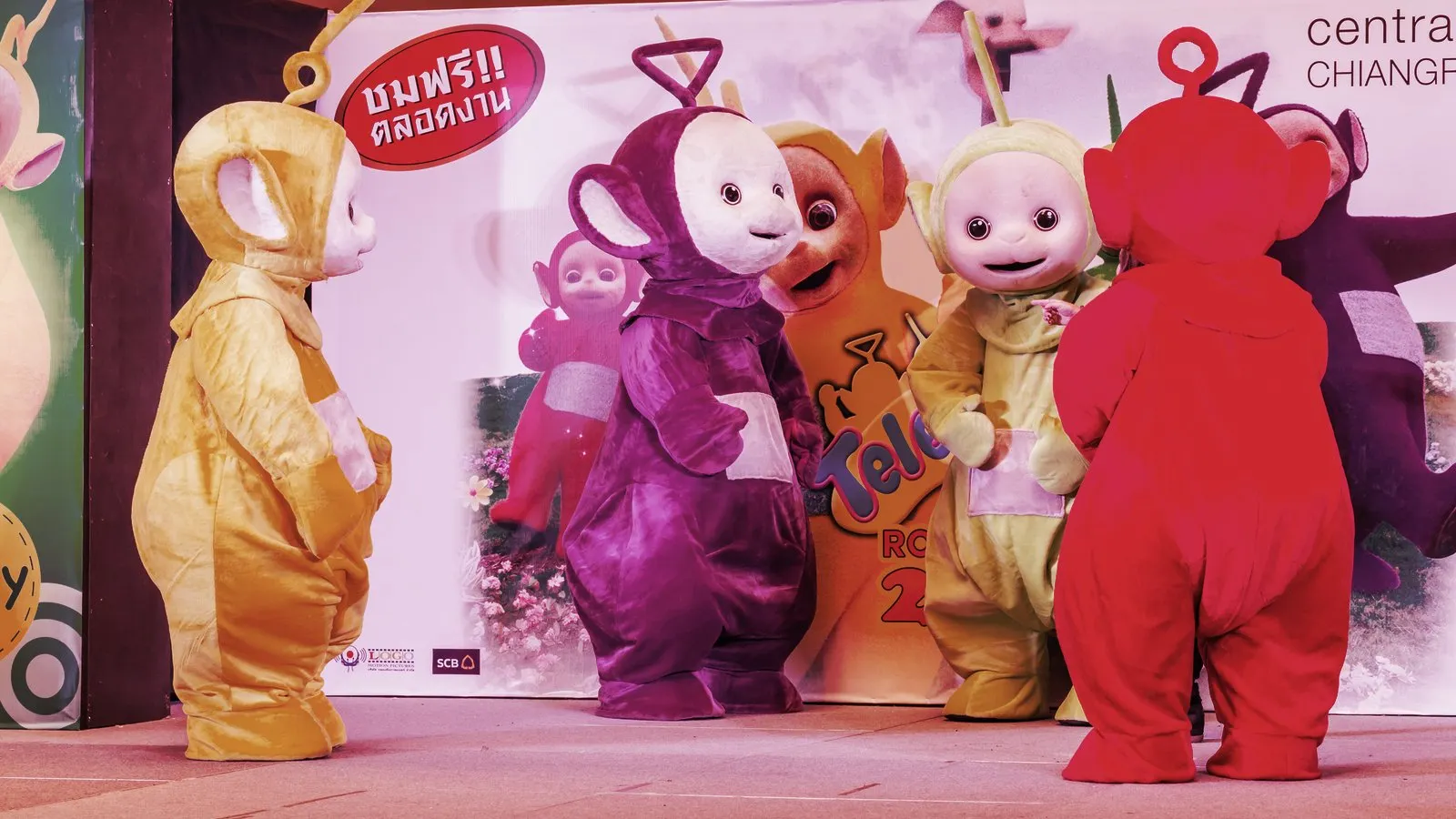In brief
- Teletubbies are real.
- But their cryptocurrency isn't real.
- Tinky Winky, Laa-Laa, Dipsy and Po just want two things: hugs and crypto.
On April 1, 2019, Bitcoin’s price reached $5,000, then its highest level since November 2018.
While the price movement was likely the result of several factors, some thought it might have been due to a prank article at crypto news site Finance Magnates called “SEC Drops the Bomb: Approves Bitcoin ETFs.”
Two years later, and a U.S. Bitcoin ETF has yet to materialize, but Bitcoin is definitely in on the joke, as its price is near $60,000 and big-name brands are leveraging Bitcoin's booming popularity (but still-confusing workings) to market themselves.
Until this year, many of the April Fools' stories involving Bitcoin had been aimed at insiders with a working knowledge of the ecosystem and its players. Last year, for example, Bitfinex, the sister exchange of stablecoin issuer Tether, announced Bitfinex Energy, a Monster-like drink. Bitfinex tweeted, “Bitcoin never sleeps so why should you?”
Bitcoin never sleeps so why should you?
Introducing The Bitfinex energy drink, coming soon! 😎 pic.twitter.com/srec6JQXlh— Bitfinex (@bitfinex) April 1, 2020
This year, more broadly recognizable consumer-facing brands are getting in on the act.
The company behind Teletubbies, the BBC children’s show that haunted your dreams from 1997 to 2014, today announced TubbyCoin, billing it as an "innovative" new cryptocurrency that "employs cutting-edge cryptographology to convey the inherent value of Big Hugs! in the form of exchangeable TubbyCoin ‘BigHugs!’ Tokens, featuring Tinky Winky, Laa-Laa, Dipsy and Po.” (Surely tokens by that name will soon be trading on Uniswap.)
Sorry to disappoint, but—surprise!—the cryptocurrency is an April Fools' joke, part of a social media campaign to raise money for charity.
Michael Riley, the Chief Brands Officer of WildBrain Labs, which owns Teletubbies, wrote in a press release: “Although TubbyCoin is not really a cryptocurrency, our hope is that you’ll still enjoy sharing TubbyCoins with friends, family and anyone who needs a hug.” WildBrain says it will donate $1 dollar for every #TubbyCoin shared on social media, up to $10,000.
Eh-Oh...what could the Teletubbies be possibly hiding from us? Stay tuned for something BIG this week. 🚀 #Bitcoin pic.twitter.com/fJ2NBXsENx
— Teletubbies (@TeletubbiesHQ) March 31, 2021
Not everything Bitcoin-related on this April Fools’ Day is a prank.
Chipotle, the fast-casual chain known for its guacamole and past E. coli outbreaks, revealed earlier this week that it would be hosting a game entitled “Burritos or Bitcoin” on April 1 in honor of National Burrito Day. 10,000 people will win a burrito, 50 people will collect $500 in Bitcoin, and three contestants will snag $25,000 in Bitcoin.
Or so the company says.
We don't joke about burritos -Alex
— Chipotle (@ChipotleTweets) March 31, 2021
National Burrito Day is real (though, we’d argue, a victim of poor scheduling). And the legalese accompanying the game rules looks very real. So, if you wish, you can go to burritosorbitcoin.com and get yourself a burrito... or Bitcoin.
And then there’s Volkswagen's debacle.
The German automaker announced (accidentally, it claims) on Monday, via a press release posted on its web site, that it was changing the name of its U.S. business to Voltswagen in a nod to its future as an electric car maker. Multiple outlets reported on the press release. Instead of admitting it was a leaked marketing stunt, the company doubled down on Tuesday, saying at first that the release was posted too early, but that the name change is real.
VW's electric vehicle plans are very real, and if successful, it poses a major threat to Tesla’s E.V. dominance, and its stock price—which has been somewhat tied to Bitcoin ever since Tesla bought $1.5 billion worth of BTC in January.
And then Volkswagen said on Wednesday that it was actually an April Fools' joke. While Germans are stereotyped for their punctuality, there is such a thing as being too early. March 29 is not April 1. The misfire could even result in action from the US Securities and Exchange Commission, if it affected VW's stock price, which Musk knows a few things about.
But you can forgive some international corporations for getting confused. On Wednesday, thanks to the wonder of time zones, it was already April Fools’ Day in India. And that was the day Flipkart, India’s version of Amazon, said it would start accepting Bitcoin payments. Normally, that wouldn’t sound like a joke, but the Indian government has been openly floating a ban on cryptocurrencies, including Bitcoin.
Which is why, three hours later, the e-shopping company said it was all a joke. Ha. Ha.
B̶i̶t̶c̶o̶i̶n̶ Supercoin*
Oops 😉 #AprilFoolsDay
— Flipkart (@Flipkart) March 31, 2021
As readers become more skeptical, brands must become more savvy at their pranks, making it difficult to distinguish fact from fiction—if they feel they absolutely must do these pranks.
But on this April Fools' Day, there’s one thing we absolutely hope isn’t a joke: the “Tiger King” NFT collection that Jeff Lowe has announced is coming out April 1, despite legal opposition from Joe Exotic.
Who says April Fools' Day is a second-rate holiday?

